Philosophy as a knowledge-building discipline
(Edited)
Ulises Flores
12/10/2019
¡Greetings dear Stem-reader!
I invite you to travel in time and geography to move us to the cradle of knowledge, Greece. Where knowledge flourished from a set of beliefs that are worth revising. These were the lands where the basement was woven, which became a recognized and studied discipline, philosophy.
▂▃▅▆▇ Introduction ▇▆▅▃▂
Since man exists, he has dedicated a great part of his life to the search for something, a guide, lights, signs that indicate the way to the truth. Thus, at first humanity configured supernatural beliefs externalised to those who kept respect, fear, worshipped and offered sacrifices. His perception of things led him to create and have a deity for each natural component and particular situation.
However, as we are all born with an open mind and an impetuous curiosity to know the truth, questions about existence itself began to be shaped and woven. This phenomenon served as the catalyst that encourages the emergence of builders of a bridge between the world of gods and the physical world.
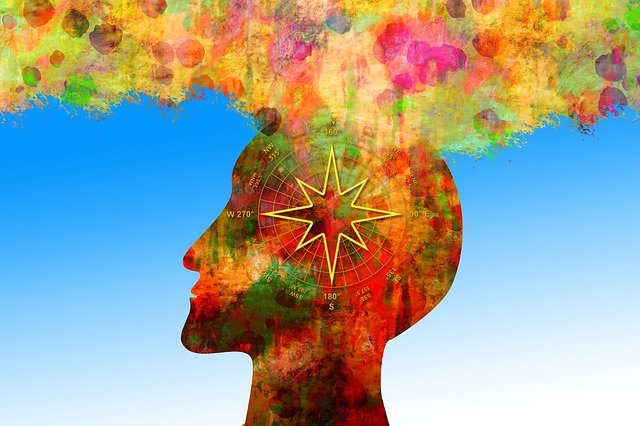
Attribution Gerd Altmann Public domain image hosted on Pixabay
It is enough to take a brief look at specialized literature to know that philosophy was born with Thales and Anaximander (6th-5th century a.e.) on the coast of Ionia, now the territory of Turkey. By then there was a complete blunder about the answers to the questions that emerged from that restlessness and questioning about existence: Who are we? Where are we? Why are we different from animals and plants? How was the environment formed?
It would be Thales of Miletus who began to formulate different approaches to human existence and its environment; leaving aside the diocesan mystical thought that had been handed down from generation to generation.
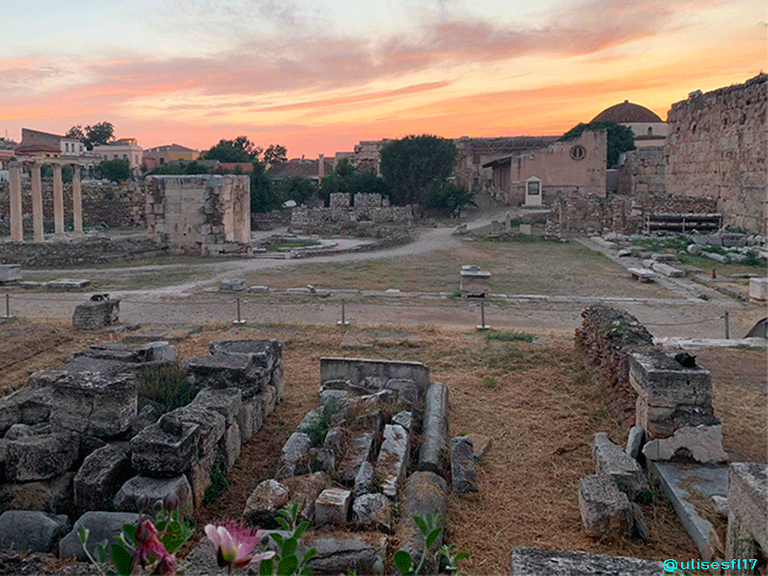
Ruins of buildings of the ancient Greek Acropolis. They remain in spite of the damage caused by invasions, war destruction, events and natural degradation of materials; vestiges that are preserved and have been declared World Heritage by UNESCO.
Source of Wisdom
Consequently, one passes from the era of the gods where Apollo, Dionysus, Orpheus... They establish divine spokespersons on Earth through the Oracles. This is the sphere of divination. In his work The Birth of Philosophy, Colli, G. (1977), refers to this era by affirming that madness is the source of wisdom. The Greek civilization took wisdom seriously; without underestimating that other peoples drank from this ancestral knowledge and exalted divination; however, none elevated it to a decisive symbol, by which, in the highest degree, power is expressed in knowledge as it happened among the Greeks; hence Greece is said to be the cradle of knowledge.
There is an analogy to illustrate the explanation, just as today there is an educational center somewhere in the Venezuelan territory, in the Hellenic geography there were many sanctuaries destined to divination, this was part of their mystical customs, culture, politics, public life, in other words, it was the dawn of Greek philosophy. Following the Hellenic mystical and cognitive approach, it is opportune to quote the maximum reference of the exegesis and philosophical nature of these great sages: "it is only good for a sane person to do and say what concerns him, and to know himself". Source [p. 36]. Here is the complex language to describe and interpret. Indeed, metaphors, aphorisms, enigmas and phrases with an encrypted message loaded with deep knowledge is what characterizes Western classical philosophy.
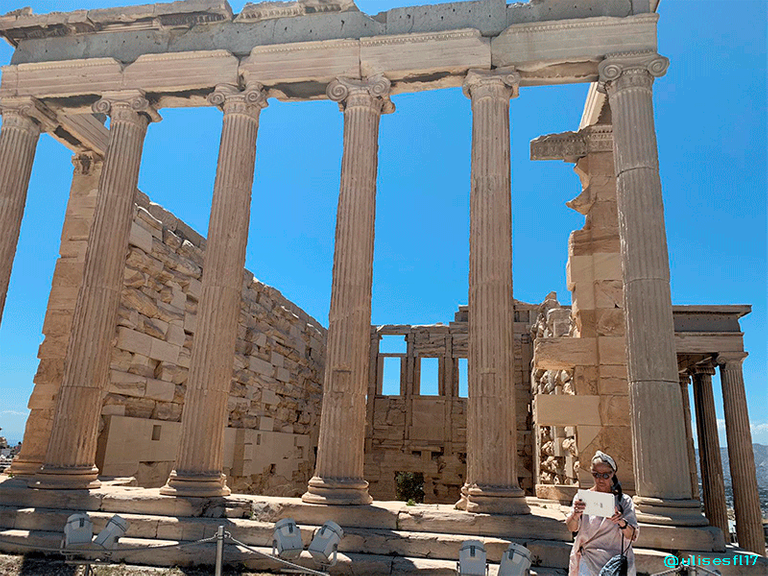
Vestiges of the Parthenon, a building built between 447 B.C. and 432 B.C. in the Acropolis of Athens. In the place where this temple was built, 35 years before the construction of the well-known pre-Parthenon or hecatompedon had begun; a kind of sanctuary for the Athenian noblewoman. It collapsed during the medical wars by the hordes of Xerxes.
Knowledge Base [per se]
As it is known, in the pronaos of the ruins of the Temple of Apollo in Delphi the aphorism Know Yourself was written... Not only the Greeks took this seriously, the Egyptian culture and in the Vedic literature itself it is insisted that humanity must begin to know itself and emphasizes that through this knowledge it will be able to know the universe, the ALL. The wise are right, that uncertainty and desperate curiosity to find something physical that shows what the human ego (mind) wants to see in the world of the physical, has kept most men in a kind of conscious and cognitive dream. It has been looking outside for what is inside. Now, the voice of divinity represented by the oracle reaffirms: nothing in excess. Know Yourself.
This enigmatic challenge comes to mean a rupture between the human world and the divine sphere. Yet, in the midst of the archaic epoch, the enigma is presented as something more separate from the divine in which it proceeds; it tends to become the object of a human struggle for wisdom. This character imprints passion when historical challenges are recreated among sages; for example, it is recorded in the Greek epistemology that, in the sanctuary of Claro, located in the polis of Colofón (Jonia), during an exceptional contest of sages Calcante and Mopso were found; the first one in mention, a notable fortune-teller son of Anfiarao; while his opponent, another illustrious fortune-teller son of Manta. The Greek historian and writer Hesiod tells that, Calcante challenges Mopso in this way:
Source [p. 45]I am amazed at the great number of fruits that wild fig tree has, despite being so small, do you want to tell me the number of figs? And Mopso answered: They are ten thousand in number, their measure is a measure, but one of those figs is superfluous and does not fit in the measure...
And so it happened, we proceeded to the respective count and the accuracy of the answer was verified, then a dream of death covered the humanity of the sage Calcante by admitting defeat. Later, Sophocles comments that Calcante was destined to die when he found in his way a fortune-teller who surpassed his natural capacity to foretell future things, as predicted by the oracle. And is that the oracle had a very high effectiveness in their predictions, either by acceptance, faith of the consulted or because it was written and should happen.
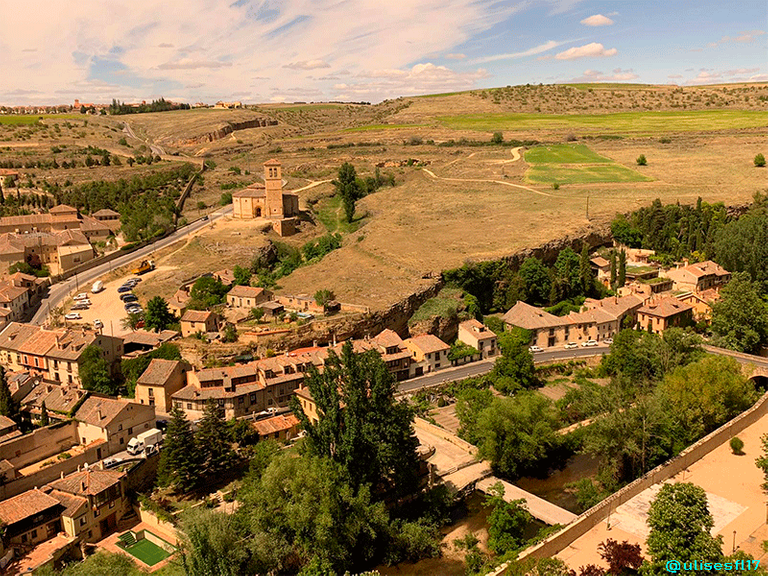
Western culture began to structure the scaffolding of knowledge on lands and populations like this one. Northeastern exit of the present atenas. It would be in a plain with scarce vegetal spot that the duel between the soothsayers Calcante and Mopso took place.
Cognitive Awakening
However, in the death of men the gods no longer intervene directly as in the beginning when he intimidated with Chimera, the Sphinx, Crackeen himself... Now it has been passed to an agonistic plane, where two men fight for knowledge, it can be said that the magic layer that presages the unknown begins to fall and men cease to be fortune-tellers. It is a sympathetic duel where the opponents get involved in the race to obtain the title of wise men instead of fortune tellers. The cocoon of the inflorescence of wisdom begins to open with this type of events where it is a question of putting into practice elements of observation, calculation and estimations with certain exactitude.
At this point, the fateful end of Homer is a compulsory and complementary reference. Who has not heard of it. An ancient story describes how Homer questioned the oracle about who his parents were and what his homeland was. In an Aristotelian fragment it is stated that the oracle answered: The island of IOS is your mother's homeland; and it will welcome you when you die. But, you beware of the enigma of young men. asks them if they had grabbed and carried something.
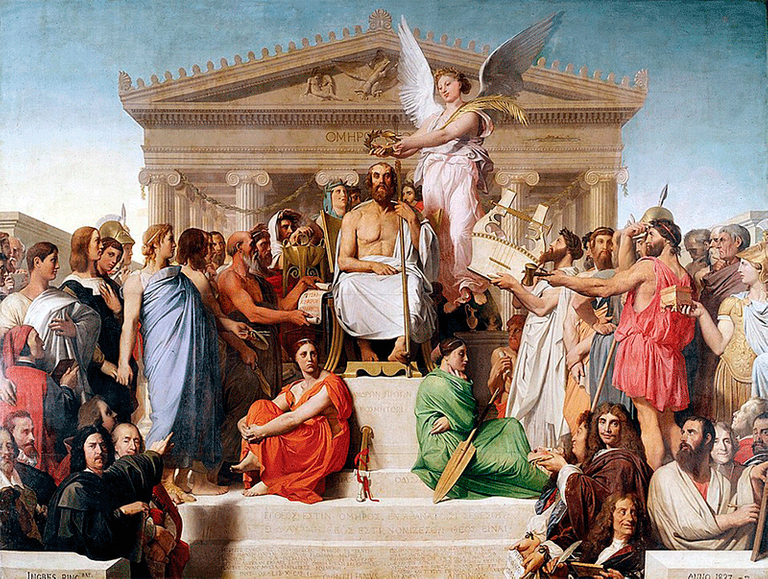
Attribution Jean Auguste Dominique Ingres - wartburg.edu Image of Public domain hosted at wikimedia The apotheosis of Homer, work of Jean Auguste Dominique Ingres - 1827, which is in the Louvre Museum.
It turns out that the fishermen had not had a good day and since they did not fish, they devoted themselves to delousing themselves, that is to say, to removing insects; in attention to the question he answers with an enigmatic tongue twister one of the young men.:
Source [p. 50]What we have taken we have left, what we have not taken we bring.
Well, he's answering. Presumably they were referring to lice; those they had seen were removed from their bodies and thrown into the sea, while those they could not visualize and capture brought with them. What the story does not tell us is whether the wise man, when asking the question, has taken something... The noun (fish) has been passed or is omitted by historians. In any case, Homer, faced with his inability to solve the enigma, dies of affliction. Thus the enigma represented for the wise a mortal challenge and for the oracle the fulfillment of a prophecy.
Roots of knowledge and reason
For philosophers of this stature, one who excels by intellect must prove invincible in things where the essence of human ingenuity and intellect is tested. In Heraclitus we can suppose, first of all, a connection between the two expressions with respect to "knowledge of manifest things" and "what we have seen and taken": just as Homer was deceived with regard to the elements seen and taken, i.e. the lice; because he did not know what it was about; also, men are deceived with regard to the knowledge of manifest things, because they do not know what it is about, for example, because they believe they are real, when in fact they are not. It is undeniable to smell the aroma of philosophical branches in this discursive (metaphysical) extreme, because much is said and refuted about what is not seen, but felt.
In several fragments Heraclitus even seems to postulate the soul as the supreme principle of the world. Aristotle being one of those who confirms this interpretation. Such seems to be the allusion of the famous fragment I have investigated myself that explicitly says Heraclitus: The confines of the soul cannot be found walking, even if we walk all the ways: that is how profound its expression is; moreover: To the soul belongs an expression that increases itself. Source [p. 58]
Dialectical Inflorescence
This series of events would give rise to a new form of seeking or approving knowledge; the mystical and epistemological basis of the great diviners and sages determines other methods of reasoning and reflection. If the enigma derives from the gods and flows into the agonistic estuary, it navigates downstream towards the dialectic. Dialectics is born and develops in the fields of agonism.
Dialectics is responsible for the passage from a religious mystical background to the structuring of a high-level abstract, rational and discursive thought. Here we speak of a dialectic with a meaning different from the current one; it is a true discussion between actors who measure their knowledge on certain subjects and before an audience that watches over the rules of discussion.
This is important to clarify in order to avoid confusion with literary works, for example, Plato's dialogues or any approach based on thesis and antithesis today, where an author formulates and answers questions according to his conceptual and disciplinary theoretical deduction. For Aristotle, the wise Zenon, disciple of Parmenides, was the one who created the dialectic. However, by examining Parmenides' contribution better, he neglected a certain hierarchy with respect to the character of more abstract concepts and mastery of the most universal categories. Well, the logical rigor and argumentative excellence indicates that this is the maximum exponent.
The third party principle is excluded
The method of formulating a question with two alternatives, represented by contradictory options, left the questioned in a bifurcated path to demonstrate his knowledge on the subject in question. Although the answer option that initiates the discussion (thesis) must be true, it must also demonstrate the falsity of the formulation; called the exclusive third principle, this is a dynamizing element of dialectical debate.
Of course, in order to obtain victory, a long and complex questionnaire of generating questions must be developed, which weave together the truth and falsity of the formulation. One of the resources most used by the interrogator is the series of demonstrations that the questioned person is doing, because he uses them to ask secondary and auxiliary questions that lead and come to complement the thesis.
In this sense, the questioned person rises to victory if he manages to maintain and demonstrate his thesis, that is, to prevent his thesis (affirmation taken from the dichotomous question or statement of the problem formulated by the questioner) from being refuted. And so one advances as a civilization and mind open to knowledge; whoever answers the dialectical question is no longer in a tragic loss: if he is defeated, he will not lose his life as Calcante had done to Mopso or Homer by the fishermen.
Dialectical language
Never before in the history of humanity has such a high level of knowledge been reached, the approach of a problem from a thesis that is systematically analyzed and developed from a deductive logic that completely undresses this approach, to then specify in the particularization of the same with the construction of universal concepts supported with an impressive abstract capacity of man and not of the oracle or the gods.
This is the original dialectic, its invention is due to Parmenides. It is this wise philosopher who synthesizes the most universal formulation of the dialectic question and simultaneously the formulation of the supreme enigma...
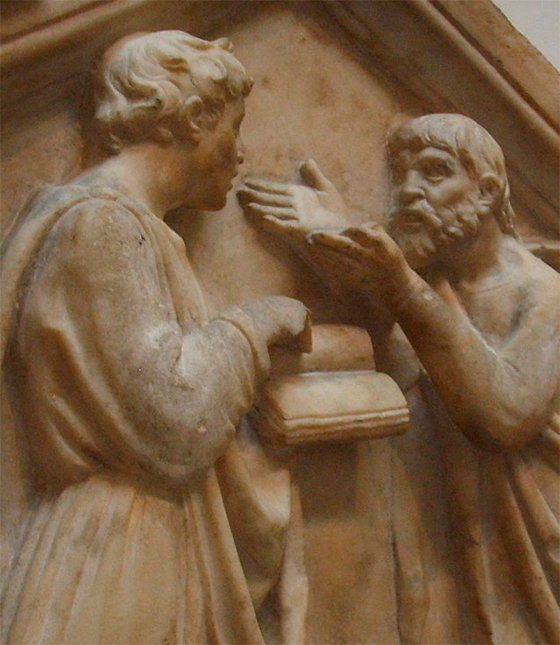
With Parménides it is pointed out that the principle of responding is, so much so that it literally forbids the slope of responding "is not". This methodical spark advances with the cognitive wick, Gorgias emphasizes and who puts an end to the era of the wise and stops the Greek dialectic train. Gorgias subjects to study and puts into practice a new type of dialectic modality by orchestrating free debates, that is, absolutely free dialectic encounters.
It is worth mentioning that the previous discussions were taking place in controlled environments with a selective audience that rarely alternated. It is Gorgias who puts the rattle on the cat and says: Debates must be held in public places (Ágora)...
This generates a way of communication where a preparation of material, expressive techniques and the use of persuasive means are made to gain public acceptance; consequently, rhetoric emerges as a complementary element. In itself it is no longer a struggle to dominate an interrogator but rather a multitude of people who by their own will and without choice attend the event.
Thus, the divulging and elemental attitude indicate that Gorgias is one of the architects of the transformation of dialectical language into a public. An essential element of this transformation is the intervention of writing, since the speeches were previously prepared and memorized by the orator.
Contributions of Aristocles Podros
With the methodical fluvial torrent gaining strength and dominion downstream, writing flourishes as another cultural branch of philosophy, a slope better known as literary philosophy. His main figure is Aristocles Podros, better known by his classic pseudonym (Plato), which broke any paradigm and doctrine with the invention of dialogue as philosophical literature. With ingenuity he introduces a series of metaphysical, political and social approaches of great importance, even many are obligatory reference of studies in the university environment of degree and advanced courses.
Final Considerations
Today, when the origin of philosophy is investigated, it is surprising to imagine the pre-literary conditions of thought; perfectly valid in a sphere of exclusively oral communication. All these conditions induced an era of wisdom as the origin of philosophy.
In conclusion, philosophy arises from a rhetorical disposition accompanied by dialectical training, by an uncertain agonistic stimulus about the direction it is going to take. Precisely, it would be Plato, then Isocrates, who would baptize him with this mystical and interesting name philosophy. Thus philosophy was born, a creature too complex and mediate to contain within itself new possibilities of ascending life..
▂▃▅▆▇ References ▇▆▅▃▂
- Colli, G. (1977). El nacimiento de la filosofía. (libro electrónico). link
- Quintana, D. (2004). El síndrome de Epimeteo Occidente, la cultura del olvido. (libro electrónico). link
Resources
At a distance and relative angle with respect to the documentary evidence in situ in correspondence with the circle of influence of the study.
Thanks to the support provided by @steemstem, @entropia, @la-colmena, @c-squared, @stem-espanol, @rutablockchain, @sinergica, @elarca, @curangel, ecotrain, upmewhale and communities that support original content.

 |
 |

0
0
0.000
@tipu curate
Upvoted 👌
Thank you for the healing. Your support is important to me and helps create more quality content.
To listen to the audio version of this article click on the play image.

Brought to you by @tts. If you find it useful please consider upvoting this reply.
Questo post è stato condiviso e votato dal team di curatori di discovery-it.
This post was shared and voted by the curators team of discovery-it
Thank you for the healing. Your support is important to me and helps create more quality content.
This post has been voted on by the SteemSTEM curation team and voting trail. It is elligible for support from @curie and @minnowbooster.
If you appreciate the work we are doing, then consider supporting our witness @stem.witness. Additional witness support to the curie witness would be appreciated as well.
For additional information please join us on the SteemSTEM discord and to get to know the rest of the community!
Thanks for having used the steemstem.io app and included @steemstem in the list of beneficiaries of this post. This granted you a stronger support from SteemSTEM.
Thank you for considering this publication. I appreciate your support.
Good morning.